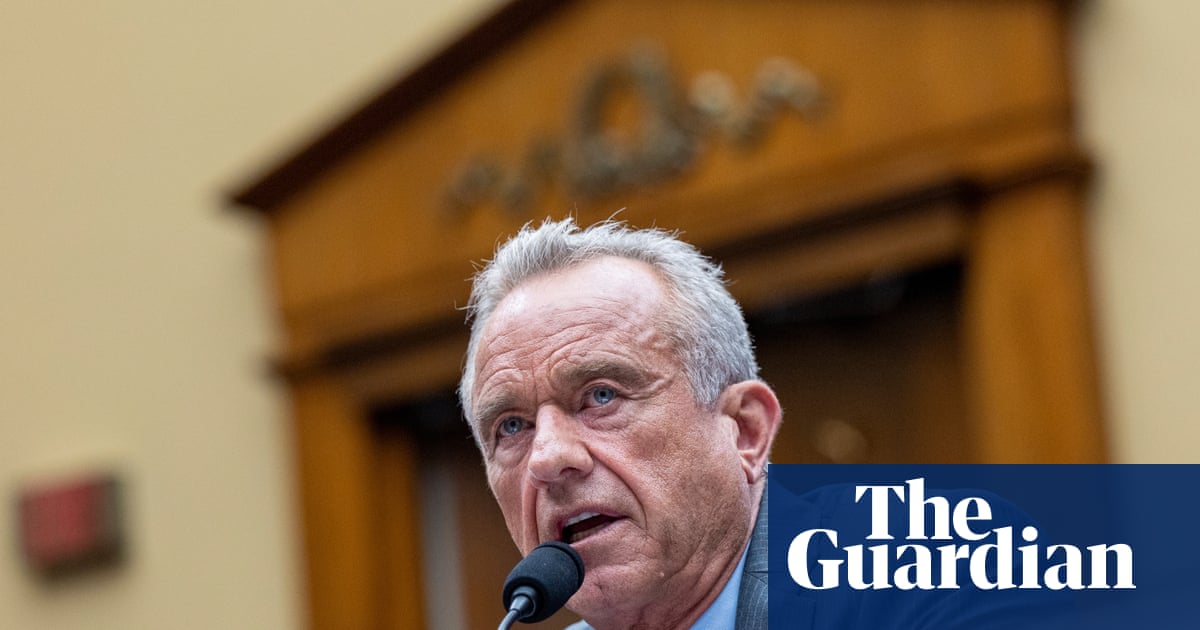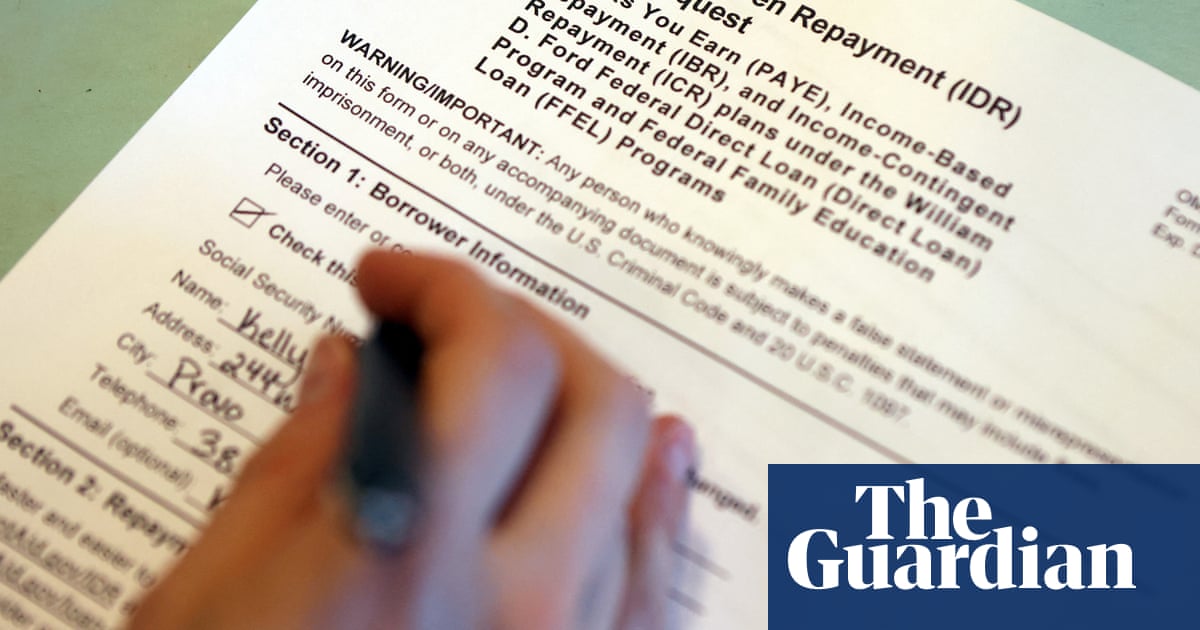As the Democratic party fights to rebuild from a devastating election defeat, the abrupt exit of the presidents of two of the nation’s largest labor unions from its top leadership board has exposed simmering tensions over the party’s direction.
Randi Weingarten and Lee Saunders quit the Democratic National Committee, saying it isn’t doing enough to “open the gates” and win back the support of working-class voters. Ken Martin, the new DNC chair, and his allies told the Guardian that the party was focused on doing exactly that.
Weingarten, president of the 1.8-million-member American Federation of Teachers, resigned after Martin did not renominate her to serve on the DNC’s important rules committee. In her resignation letter, Weingarten wrote that education, healthcare and public service workers were in “an existential battle” due to Donald Trump’s attacks and that she did not “want to be the one who keeps questioning why we are not enlarging our tent”.
Saunders, the long-time president of the 1.3-million-member American Federation of State, County and Municipal Employees, also issued a critical statement. “These are new times. They deserve new strategies,” he said. “We must evolve to meet the urgency of the moment. This is not a time to close ranks or turn inward … It is our responsibility to open the gates [and] welcome others.”

Several DNC officials asserted that the two departures were a “tempest in a teapot”, insisting that Martin is working to have the DNC welcome more people and battle against Trump. Weingarten and Saunders evidently felt sore that their candidate for DNC chair, Ben Winkler, the head of Wisconsin’s Democratic party, lost to Martin, the officials suggested.
Steve Rosenthal, former political director of the AFL-CIO, the main US labor federation, said the resignations were an inarguable blow to the DNC.
“When something like this becomes public, there’s clearly a spotlight on it,” he said. “Giving the longstanding leadership role that Randi and Lee have played in the Democratic party, and at a time when the party is trying to desperately improve its image with working-class voters and remake itself in a lot of ways, this is really unacceptable.”
In an interview, Weingarten said she wished the DNC was conducting an all-out nationwide mobilization to defeat the Trump/GOP budget bill, which would throw an estimated 11 million Americans off health insurance, cut food stamps to millions of families and cause the federal debt to soar by over $3tn.
DNC chair Martin told the Guardian that, under his leadership, the DNC was already doing what Weingarten and Saunders were calling for. “I’ve always called myself a pro-labor progressive,” Martin said, noting that he had been a union member and labor organizer. “My family grew up on programs that would be cut if Trump’s tax scam passes. Winning back the working class and stopping Trump from harming families is exactly where our focus is.”
Martin added that in his nearly five months as DNC chair, the committee has held 130 town halls and launched an “aggressive war room” to take on Trump. “My first action as DNC chair was pledging to have strong labor voices at the table,” Martin said. “Our job is to win in 2025, 2026 and beyond.”
But their resignation statements signal that Weingarten and Saunders have a very different view from Martin of what the DNC is doing on his watch. Several DNC officials said the pair might not be up to date with the DNC’s activities across the 50 states.
Weingarten told the Guardian that Martin and the DNC are not showing nearly enough urgency in opposing the Trump/GOP budget bill. “The number one issue in the next two weeks is: how do we help fight the GOP budget bill that faces almost two-to-one public opposition,” she said, adding that the DNC should be going all out to help House and Senate Democrats torpedo the bill.
“We can be the voice and be out there with stories about how the budget bill will hurt, and the DNC is a perfect place for doing that,” Weingarten said. “You got to win hearts and minds now, not in October 2026. That’s the kind of thing that we’ve been looking for since January. We have to be a party that wins on the ground.”
Artie Blanco, a union activist and DNC vice-chair, said that under Martin, the DNC had been fighting hard against the budget bill.
“There are over 16,000 Democratic volunteers making phone calls across the country in targeted congressional districts about the GOP budget, and how it will be devastating to working people,” Blanco said.
Weingarten voiced dismay about not being renominated for the rules committee. “It was definitely a sign that my input was not sought any more and [not] appreciated,” she said, stressing that the AFT “will continue to be a leader in electing pro-public education, pro-working family candidates” and planned to be “especially engaged” in the 2025-26 elections.
Jane Kleeb, president of the Association of State Democratic Committees, said that Weingarten’s and Saunders’s “claims that Ken and the DNC are not standing up for working people and not standing on the side of unions and union members is laughable”.
“Ken has been on the front line to bring unions back to our party,” added Kleeb, who is also chair of the Nebraska Democratic party. “He has appointed more union leaders than any other [DNC] chair” – and put unions at the forefront while chair of the Minnesota Democratic-Farmer-Labor party, before he assumed the DNC’s helm, she said.
Stuart Appelbaum, the DNC’s labor chair, and president of the Retail, Wholesale and Department Store Union, took issue with the statements Weingarten and Saunders made about Martin.
“I am thrilled that Ken Martin is prioritizing the importance of having labor at the table and has ensured that there is strong labor representation in every part of the DNC,” Appelbaum said. He added that Martin “understands that working people are the backbone of the party”.
Michael Podhorzer, a political strategist and former AFL-CIO political director, said the Democratic party has for decades not focused enough on working-class voters. He said Democrats would have a tough battle winning back blue-collar voters. “The experience of many American working people is they feel left off the radar,” Podhorzer said.
Democrats, Podhorzer noted, have suffered the greatest loss of support in communities that were “gutted” after the 2008-09 recession; from the signing of Nafta, a trade deal with Canada and Mexico; and from normalized trade relations with China. Nafta and normalized trade with China were ratified under President Clinton, a Democrat.
Arlie Russell Hochschild, a sociologist who has studied Trump’s success in wooing working-class voters, said the decline of US labor unions over the past 50 years has necessarily meant that unions have less sway in the Democratic party.
Rosenthal, the former AFL-CIO official and also a former DNC deputy political director, called on the DNC and Democrats to work far more closely with unions.
“Among working-class voters, support for unions is through the roof, and the Democratic party and the Republican party have no credibility with working-class voters,” he said. “They don’t trust the parties, but they trust the labor movement. It’s incumbent on the party to build bridges and put the labor movement front and center in everything it does.”
“From that standpoint,” he continued, the tension that led to Weingarten and Sauders quitting “is mind-boggling”. Several labor leaders said Martin should have done more to keep prominent and powerful union leaders like Weingarten and Saunders satisfied and on the DNC, even if they backed one of his opponents for DNC chair.
Responding to Weingarten and Saunders’ concerns, Martin said: “The DNC and our partners are leading the fight against Trump’s budget bill, investing unprecedented dollars into states so Democrats can win elections from the ground up, and reaching out to voters in working-class districts.”
Martin told the Guardian that he’s trying hard to build bridges with the broader labor movement, and increase its role in the DNC and in the Democrats’ efforts. “Winning back the working class and stopping Trump’s budget bill isn’t a political goal, it’s personal,” he said. “Labor runs through my family’s veins.”

 German (DE)
German (DE)  English (US)
English (US)  Spanish (ES)
Spanish (ES)  French (FR)
French (FR)  Hindi (IN)
Hindi (IN)  Italian (IT)
Italian (IT)  Russian (RU)
Russian (RU)  6 hours ago
6 hours ago
























Comments